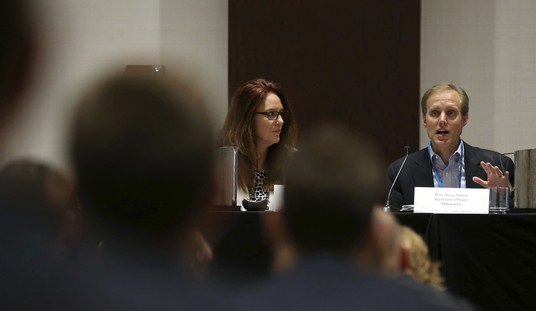We got a glimpse last night of what New Trump might sound like. Is this what he looks like?
There are improvements in this new order, starting with an exemption for green-card holders, but removing Iraq from the list of nations whose citizens require special scrutiny doesn’t make sense given the ostensible purpose of the ban. The politics make sense — we need the Iraqi government’s cooperation against ISIS and don’t want to piss them off — but the security rationale doesn’t. In the name of protecting America, Trump claims, we need a time out on visitors from countries with major terrorist elements while we implement stronger vetting procedures. Iraq’s terrorist elements are … pretty major. If the Iraqi government retaliates by banning Americans temporarily, okay, but they’re only hobbling their own fight against the jihadis. (Didn’t Iraq’s prime minister, Haider al-Abadi, already say that the country wouldn’t retaliate, precisely because it needs America’s help against ISIS?) Bending to Iraqi opinion by carving out an exemption this big leaves us a long, long way from “we should take the oil.”
I assume the real fear here is that if Trump slaps a ban on Iraq and al-Abadi resists popular sentiment to respond in kind, the government could fall and be replaced by God knows what. If the price of preventing a Shiite death squad from taking over in Baghdad is exempting Iraqis from the new travel order, hey.
President Donald Trump’s new immigration order will remove Iraq from the list of countries whose citizens face a temporary U.S. travel ban, U.S. officials said Tuesday, citing the latest draft in circulation. Trump is expected to sign the executive order in the coming days.
Four officials told The Associated Press that the decision followed pressure from the Pentagon and State Department, which had urged the White House to reconsider Iraq’s inclusion given its key role in fighting the Islamic State group…
The new order includes other changes as well. The officials said the 12-page document no longer singles out Syrian refugees for an indefinite ban and instead includes them as part of a general, 120-day suspension of new refugee admissions.
The officials also said the order won’t include any explicit exemption for religious minorities in the countries targeted by the travel ban. Critics had accused the administration of adding such language to help Christians get into the United States while excluding Muslims…
Under the revised order, officials said, all existing visas will be honored.
Nearly 60,000 visas were revoked under the initial travel ban. Per the excerpt, the number revoked under this one will be zero. The bit about “pressure from the Pentagon” rings true, too, as Jim Mattis was reportedly irritated that the first travel ban was rolled out with little guidance from the Pentagon and no exceptions made explicitly for interpreters who’ve aided the U.S. military. (Trump’s order did allow DHS to make exceptions for individual visitors on a case by case basis.) Mattis, the “calmer-in-chief” under Trump, met with al-Abadi in Iraq a little more than a week ago to affirm that, no, we don’t want to take their oil and, yes, their partnership against ISIS is very important to us. Mattis seems to have particular sway with Trump among his cabinet members; it may be that he came back from that trip insisting that Iraq had to be dropped from the new ban and Trump, as he did with waterboarding, deferred to him.
The new order will reportedly also be rolled out after a short waiting period, giving agencies time to develop procedures for implementing it. That corrects a major problem with the first order, which was allegedly signed without much input from John Kelly and dropped on DHS’s desk before the department had fully prepped agents for how to deal with visitors from banned countries at U.S. airports. Although that raises a question: Trump defended the quick rollout of the initial order by claiming that any delay would have given the bad guys a chance to hurry up and enter the country before the ban took effect. If that’s true, why would Trump delay implementation of the new order by even a single minute, especially now that jihadis know that a new ban is imminent? And again, why would he exempt Iraq? If there were enough terrorists there a month ago to justify a nationwide ban in the first place, without notice, surely there are enough still there that they shouldn’t have their visitation privileges fully restored, right? (Of the seven countries from which visitors were temporarily banned under the initial order, only Iraq and Somalia have produced citizens who’d attempted to engage in terrorism here. In fact, it was Iraqi citizens who were involved in the Bowling Green plot that Kellyanne Conway famously misremembered.)
The big surprise to me in the new ban is that they didn’t add a non-Muslim country to the list of prohibited nations to undermine the argument that the ban is singling out Muslims. The Ninth Circuit dinged them for religious discrimination based in part on things Trump had said on the stump as a candidate; dropping Iraq from the list of seven, scaling back the ban on Syrian refugees so that it’s temporary, and, most importantly, eliminating the language about exempting religious minorities in targeted countries will give the administration more ammo to counter that argument in the next court fight. They could have stuck Colombia in there because of FARC or North Korea because of, er, North Korea, but for the moment they’re staying with Iran, Libya, Somalia, Sudan, Syria and Yemen. We’ll see how that works out for them. Exit question: What’s the rationale for downgrading the ban on Syrian refugees from indefinite to 120 days, the same as the other countries on the list? Again, the politics are obvious — Syria has a more urgent refugee crisis than any other country in the world, which makes it seem especially cruel to bar the persecuted permanently. But if the threat of terrorism from the country was supposedly so dire in late January as to warrant an indefinite ban, presumably it’s still just as dire today, in early March. (In reality, given the extra vetting refugees go through, the threat isn’t that dire.) Politics isn’t supposed to trump national security, but isn’t that what’s happening in the revised ban?








Join the conversation as a VIP Member